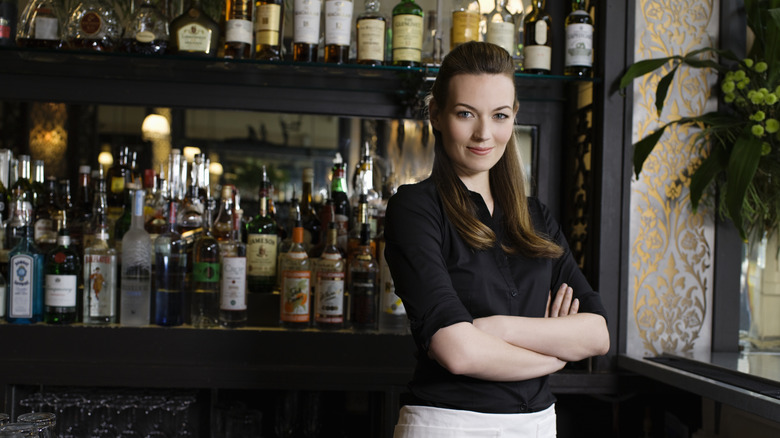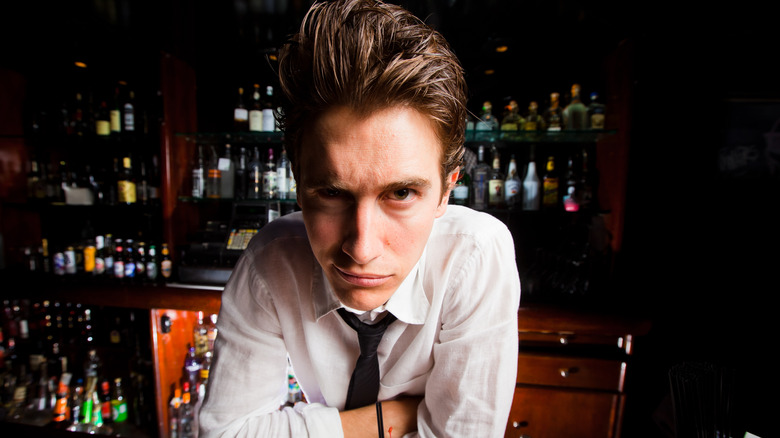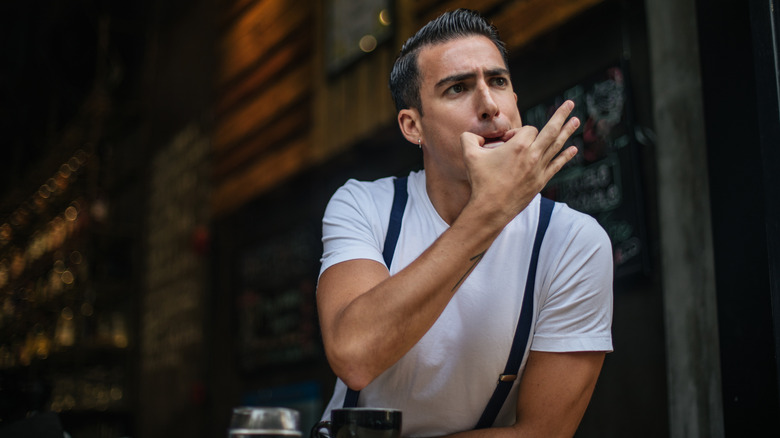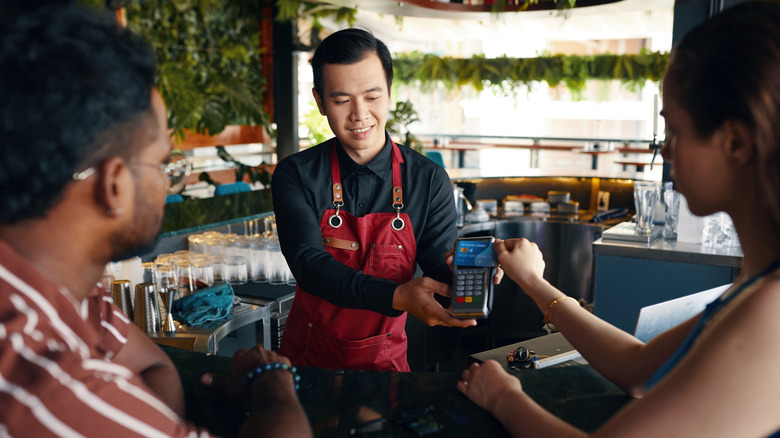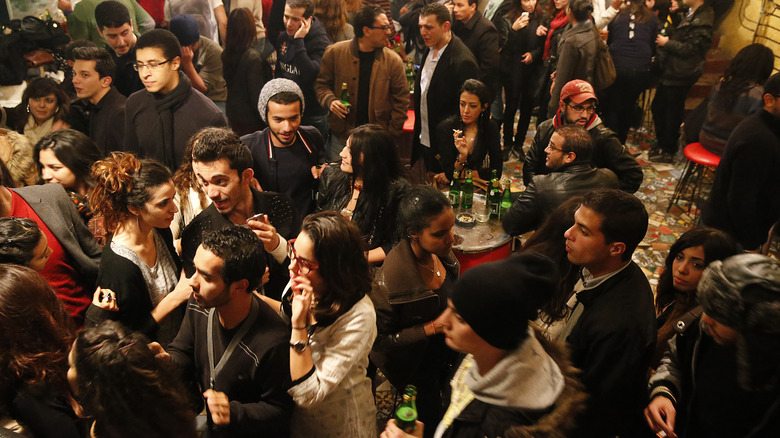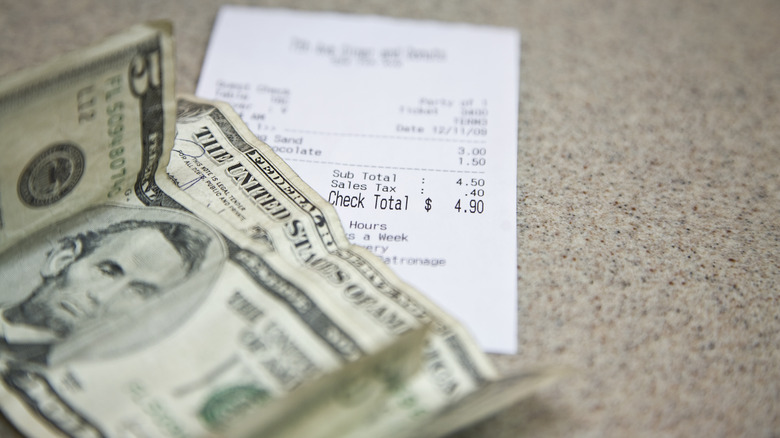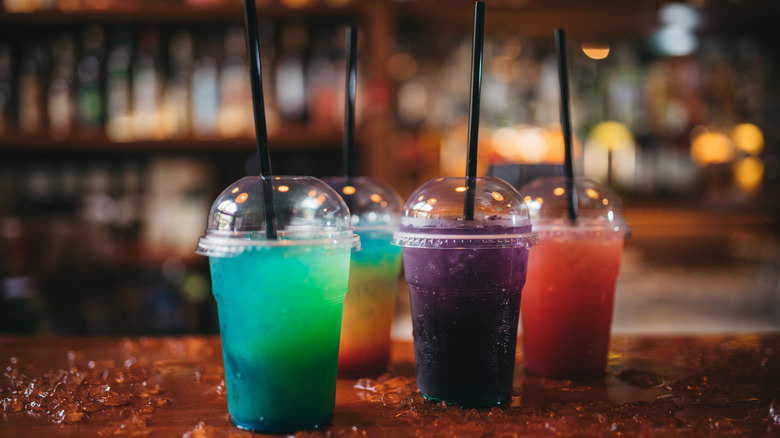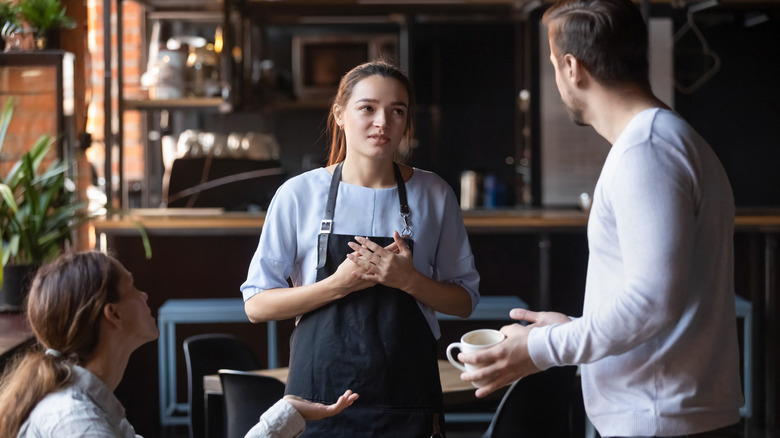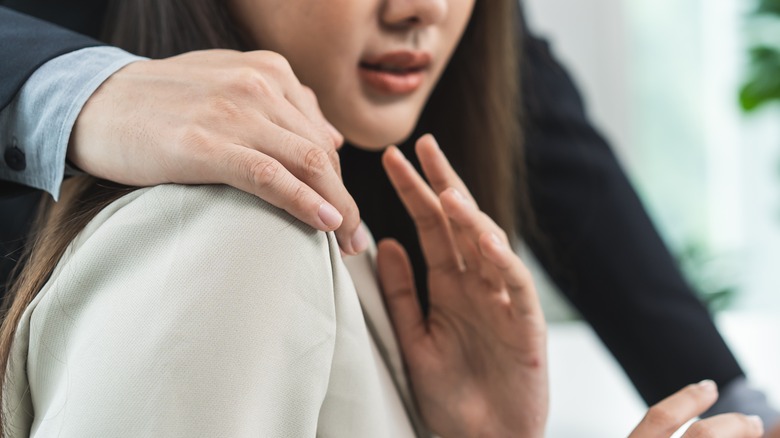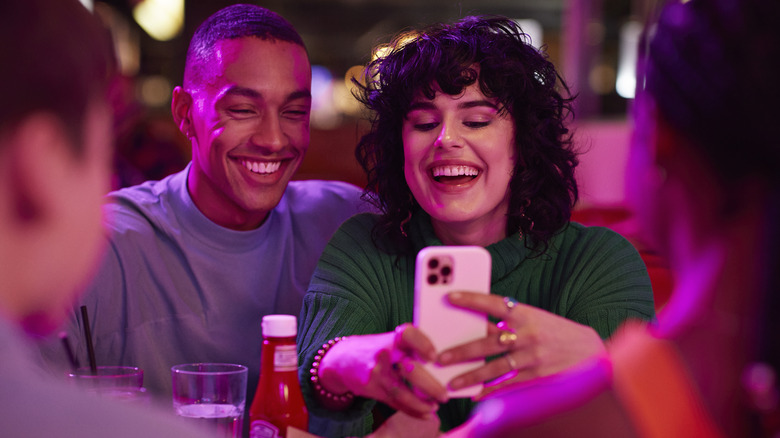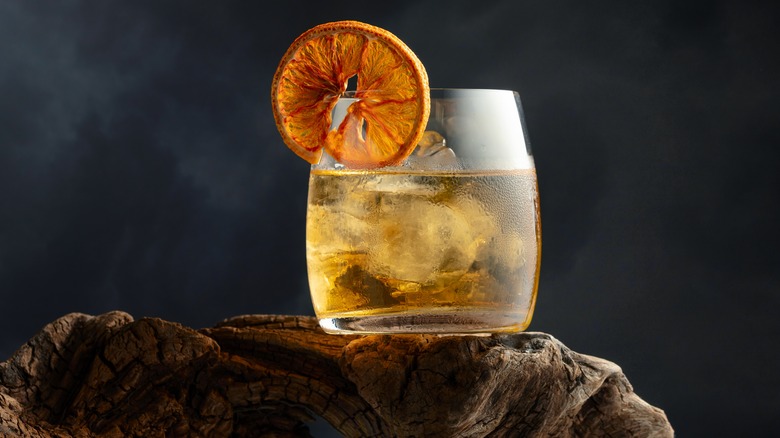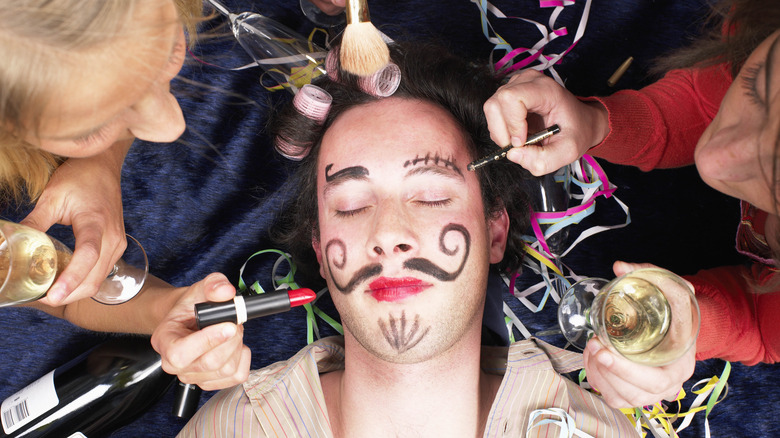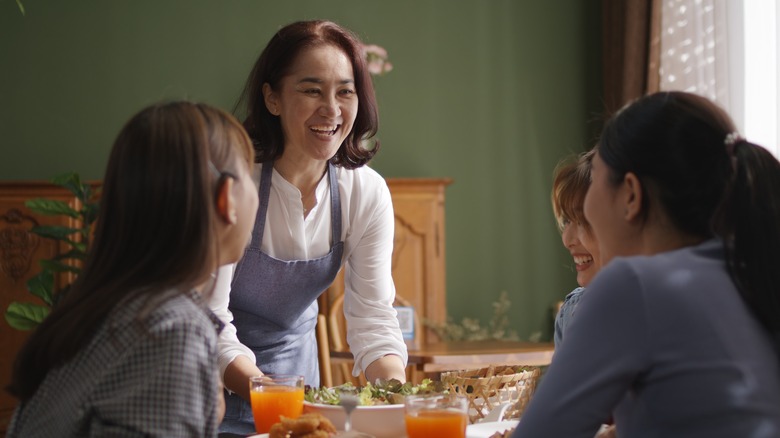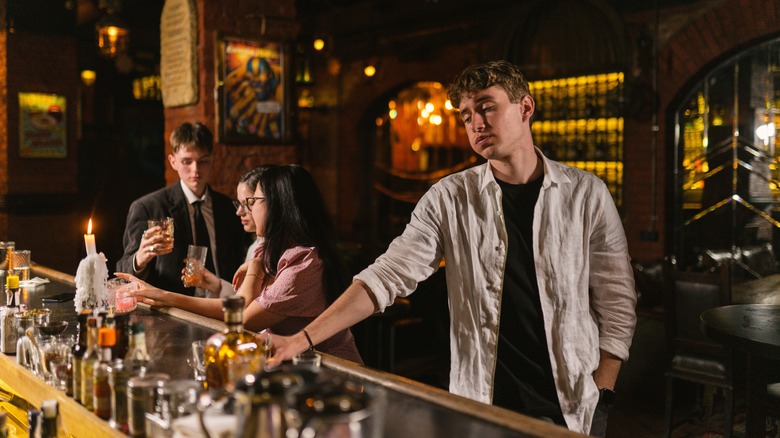13 Things Bartenders Say That Will Get You Ignored At The Bar Every Time
You've been sitting at the bar for 10 minutes and it seems like your bartender is tending to everyone else but you. Or, maybe you've been at the bar for an hour and the once lively, conversational bartender is now giving you the cold shoulder. Why could this be? The truth is, there are so many unspoken rules of the bar that you could have blundered and are now keeping your host at the other end of the bar. With the help of a wide range of bartenders, I unearthed some of the top reasons bartenders avoid customers.
I worked in the service industry as a bartender and server for around eight years. As such, I have access to a couple large, private bartending groups. I asked current and longtime bartenders to shed light on why they'd be willing to ignore a patron (and the potential money that comes with them). Hundreds of responses, a few in depth conversations, and a trip down memory lane have helped serve up some of the top reasons a bartender may be ignoring their guests. Keeping these bar no-no's in mind before walking into a restaurant or bar will have you staying in your bartender's good graces and help keep your drinks full.
1. You asked them to smile
If there is one universal social faux pas that acts as a switch to turn a whole bar against you, it's asking a service worker to smile more. When I posted on Bartenders Only asking bartenders of all backgrounds and experiences levels what customers did that really bothered them, smiles came up frequently. In fact, the most common response and comments with by far the most likes referred to customers remarking on the state of their smiles.
Asking someone to smile, or telling them they look better with a smile on, is at best overplayed and at worst an egregious overstep. As someone who once upon a time served liquor with a serious looking face, I've had this comment thrown my way more times than I'd like to count. I can attest that it's the quickest way to sour a conversation. Actually, if you have this comment loaded in your chamber, the cold shoulder is the best you can really hope for. Many bartenders would serve your Long Island with a side of sass, aggression passive or not, after the perceived slight. Simply put, if you're going to ask your bartender why they're not smiling, be ready to either wait for service or be asked why you're not funny enough to warrant said smile.
2. You snapped, whistled, or knocked on the bar
Bartenders deserve the same amount of respect as anyone you work with or interact with, so why are you whistling and snapping at them? Justin Richie, a service worker of 16 years who has tended bar at some of the coolest locations on the East Coast, is tired of this rude practice. "Being snapped at is one of my biggest pet peeves," he relayed in an exclusive Q&A. "We tell you our names at the beginning for a reason."
Snapping or whistling is just demeaning, and makes service workers feel like you're calling them like you'd call a dog. If you treat the waitstaff like dogs, don't be surprised when they bite back with a not-so-subtle retort. Chances are, though, they'll just ignore the noise coming from whatever rude call for service you're putting out.
It's not just the snapping and whistling that bartenders tune out. They will also ignore shaking the ice in an empty glass, rolling an empty beer can on the bar, knocking on the bar, and shaking the credit card slip around like a polaroid picture. Basically, if you're not willing to wait patiently for your bartender to serve you, then gravity just may miraculously increase and slow them down tenfold.
3. They are serving someone else and you interrupted
One of the biggest collective pet peeves of bartenders is being pestered while they are actively helping another customer. Bartenders provide service for sometimes hundreds of patrons a shift, and it's rude to both the server and served to interrupt this service. When doubled with the bizarre, overwhelming urge to snap or whistle at your bartender that some patrons feel, this interruption of service is bad manners.
I have personally heard snaps and whistles directed to my back while taking another customer's food order. This is only slightly better than hearing, "Service!" or "Barkeep!" thrown at you. Besides completely ignoring the annoyance for longer than I would have if they hadn't interrupted, the response to this behavior is to turn around and scold the transgressor. This typically makes them pretty embarrassed.
These demanding customers who want to take you away from other customers tend to tip less as a default, most bartenders have found. Melba Tucker, longtime bartender and owner of Downtown Uncorked in College Station, Texas, specifically trains her bartenders to handle "finger snappers." "Patience and the knowledge they'll probably only tip 15% are the way to get through their visit," she relayed to me in a Q&A. Tucker's establishment is a high-end wine bar, so these snappers won't get completely brushed aside, but interrupting your bartender in more casual environments will have steeper consequences.
4. It's busy
Something the movies always seem to get wrong about bartenders is that they have unlimited time to chat, even when the bar is full. While sometimes they certainly do enjoy a good conversation, there are some times when a bartender just cannot get everywhere as quickly as they'd like. Sometimes your bartender is truly not ignoring you for any reason other than they are slammed. If the bar looks busy to customers, I guarantee you the bartender is even busier than they seem.
A bartender's priority is their own bar guests, because that's where their money comes from. However, bartenders are typically responsible for all the alcoholic drinks of the entire establishment, and maybe some non-alcoholic ones as well. Some restaurants make their bartenders responsible for to-go orders as well, which can put them in the weeds quickly. Sure, they may chat while making a drink, but slinging drinks can be a full minded activity when there are six drink orders swirling around in their head. When you see your bartender making back-to-back drinks and going in and out from behind the bar, don't take it personally if they haven't been back to you in a while.
5. You're a known bad tipper
Surprise, tips are how bartenders make the vast majority of their income. Most bartenders do get tipped out by their serving coworkers, because in most restaurants the bartender plays a vital role in making their tables' drinks. They may also make a bit more hourly than serving staff does. However, a lot of bartenders tip out other employees as well. Bar backs and bussers often get a portion of the bartender's tips, but some establishments require workers to tip out based on a percentage of their sales. This means that regardless of a tip, they will be paying a tip out for your tab. A bartender is not enduring everything on this list and more just to get stiffed, so if they know you are a bad tipper, don't expect the best service they have to offer.
The fastest way to work yourself down on the priority list is to become known as a bad tipper. The bartender could remember you from a previous visit, or you could have closed out your tab numerous times and have left little to no tip each time. Either way, they'll mark you in their mind as a customer they are working for free for, and a bartender doesn't love volunteering their time. This applies even stronger if the bartender has worked a double.
6. The drinks you've been ordering are complicated
This is nothing personal, really. There are just some drinks bartenders are begging you to stop ordering. Don't get me wrong, I respect your right to get the strawberry daiquiri or mimosa flight of your dreams. However, if your drink involves a blender or more than four ingredients, you're likely going at the end of the service list. Bartenders want to help as many people as quickly as they can when they're busy, and cracking out the dreaded blender during a rush sounds like a nightmare. In fact, I think I've actually woken up in cold sweats over dreams of endless frozen margaritas.
In addition to ordering blended drinks at the bar, if you've ordered anything that needs muddling or a drink off a specialized menu, you may be holding up the drink queue. I once worked at a hotel bar that had around 20 complex house cocktails, and I would hide the bar menus before the rush. If your bartender is avoiding your gaze and your drink has muddled herbs or fruit, please know it's not you who has offended your bartender, it's your drink!
7. You've been demeaning toward the bartender or other patrons
If you're going out in public with other humans, please be kind. Or at the very least, do no harm. The service industry is packed with people of all backgrounds and lifestyles, all of which are entitled to a safe working environment. For a lot of restaurant workers, their place of work is a second home. Restaurant staff regularly pull back to back doubles, open/close shifts, and often have stretches where they really are only home to sleep. How would you feel if people came to your house and belittled you, after you've given them food and drinks? Slurs and other unforgivable language will not only get you refused service, but in most decent establishments will get you kicked out altogether.
Restaurant staff tend to stick together, so if your bartender doesn't hear a certain comment or chooses to ignore it, chances are another staff member will act on it. Justin Richie is a member of the LGBTQ+ community and has experienced his fair share of nasty comments from customers. "I've worked in places where the whole staff rallied and the guest wasn't welcome back," he said in relation to those situations. Unfortunately, this is not a rare occurrence for marginalized groups. Luckily, staff and even other patrons often band together for good when this does occur.
8. You touched the bartender or anything behind their bar
One of the overarching rules of going to a bar is that you stay on your side of it. Overreaching that invisible wall where the bar ends and the well begins is a huge no-no, whether it be touching your bartender or touching any of their tools.
No one likes to be touched by strangers. This goes for all you regulars out there, too. No matter how long you've been coming to Dave's Forlorn Saloon and sitting on the same barstool, your bartender probably doesn't want you patting their shoulder or touching their hand. This goes tenfold for any other escalated touches. Personal space is sacred, especially when working with people all day and/or night.
One thing that is almost more frustrating and grating than the brush of foreign fingers is a breach of the bar. If your bartender is busy, that is not an invitation to grab a bottle and attempt to pour your own drink. This will likely get you cut off and kicked out, because it's not only illegal, but a huge offense to your bartender.
9. You're an influencer
I am all for doing things you enjoy, so if taking pictures and videos of your adventures is what does it for you, then awesome. However, no one really likes being filmed without their permission, especially when they are at work. This wasn't as prevalent when I was bartending a few years back, but with the rise of TikTok and social media influencers, bartenders are seeing cameras more and more. Taking a photo of your cocktail is one thing, but filming the bar area and the bartender at work is another.
Not surprisingly, if your bartender catches you filming selfies with them in the background, they're likely to stay away from your side of the bar if they can. If you would like to film in a bar or restaurant for your social media or something related, just ask. The owner may love the exposure and the staff may have fun with it, but coming in unannounced to film is a bit rude, don't you think?
10. You asked for your drink extra strong
Don't do this, it won't have the effect you're looking for. Asking for your drink "extra strong" or for your bartender to "hook you up" makes you look cheap, which then makes your bartender think you'll stiff them on a tip. Giving out extra alcohol is typically looked at as stealing, and your barkeep could get into serious trouble for it. Some bars even digitally track their alcohol pours and will know when over pours happen too frequently. It's really not worth "hooking up" a customer for extra alcohol.
This is especially annoying if you're asking for a drink that is basically already all alcohol to be stronger. This goes for you old fashioned, Long Island iced tea, or martini lovers. Claiming these drinks don't have enough alcohol makes it obvious that you either have no idea what you've ordered or you're trying to game the system. If your bartender does give you an extra pour, they'll typically ring you up for a double, whether they explicitly tell you this or not. If you insist on a stronger drink, you'll almost always be charged for more.
11. You're already drunk as a skunk
This is a general rule that applies to all bars, and is one for everyone's safety. Bartenders are trained to be able to tell if patrons are intoxicated and honor bound to not over serve. It's not only unethical to serve someone who is showing signs of intoxication, but incredibly unsafe. Both the bar and bartender could receive serious consequences for doing so. If you come into a bar having already been served to the point of intoxication at another, you'll likely be turned away. The last place where you were served can be and have been found responsible for your level of intoxication, and no one wants to be liable for an accident.
Your bartender may also ignore you if they see you downing shots or ordering rapidly. They do not want you to drink too much alcohol too quickly, because then they have a case of intoxication on their hands. They may instead fill your water glass or give some attention to other bar-goers. Slowing down the rate in which you get drinks could help keep you and the people around you safe.
12. You're talking too much
Talking to your bartender is totally okay, but taking up all their time is not. Even if you don't see anyone else sitting at the bar, your bartender very likely has plenty to do. Whether it's side work, restocking, or running food to tables, every bar has a different standard of work for their employees. The bartender may also be responsible for the tables surrounding the bar. All this is in addition to making the drinks for the entire restaurant. Usually, servers will ring in their table's alcohol orders for the bartender to make. An empty bar in no way means idle hands.
With that being said, part of a bartender's job is to keep an open line of communication with their guests. There are some patrons that come to a bar alone in the hope that someone can lend an ear, which often ends up being the bartender. Usually, this is totally okay and even expected. Like with every interaction, though, you should read social cues. Don't hold your bartender hostage with an extended conversation, and they are more likely to return when they can once again spare a moment and an ear.
13. You are making your bartender uncomfortable
Sexual harassment is serious, and unfortunately bartenders deal with it on a daily or nightly basis. Asking for selfies with the bartender, asking for personal information, dropping pickup lines, or commenting on their body in any way are all not okay. Touching your bartender is another level of unacceptable, and service workers are always on guard for the touchy feely customers. All of the above can be grounds for being cut off and tossed out of a bar, but especially if you physically harass the employees.
Service workers, for the most part, look after one another and Justin Richie backs this up, saying, "If you're being weird or aggressive towards any staff member (especially women), then you're out." Melba Tucker, as an owner, approaches the situation a bit differently, while still supporting her staff. According to her, when one of her employees is put in one of these compromising positions, she freezes the customer out: "I take over serving them when it first happens and when they come back, there's no eye contact, smile, or chit chat." This usually ends up with the customer getting the picture that their presence isn't appreciated there.
